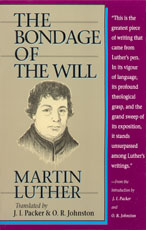Martin Luther
Martin Luther writes: “It is, then, fundamentally necessary and wholesome for Christians to know that God foreknows nothing contingently, but that He foresees, purposes, and does all things according to His immutable, eternal and infallible will. This bombshell knocks ‘free will’ flat, and utterly shatters it; so that those who want to assert it must either deny my bombshell, or pretend not to notice it, or find some other way of dodging it.” (The Bondage of the Will, p.80, emphasis mine)
Martin Luther adds: “For if you hesitate to believe, or are too proud to acknowledge, that God foreknows and wills all things, not contingently, but necessarily and immutably, how can you believe, trust and rely on His promises?” (The Bondage of the Will, pp.83-84, emphasis mine)
Martin Luther concludes: “If, then, we are taught and believe that we ought to be ignorant of the necessary foreknowledge of God and the necessity of events, Christian faith is utterly destroyed, and the promises of God and the whole gospel fall to the ground completely; for the Christian’s chief and only comfort in every adversity lies in knowing that God does not lie, but brings all things to pass immutably, and that He will cannot be resisted, altered or impeded.” (The Bondage of the Will, p.84, emphasis mine)
What’s missing in Luther’s “bombshell” is that God is an eternal being. God can know the future, without having to determine the future, because God is independent of time. For instance, I know that the events recorded in the book of Revelation will come to pass exactly as foretold, because God is there right now. It is the “eternal now” perspective taught by C.S. Lewis. That’s part of what it means for God to be eternal.

In other words, according to Martin Luther, God cannot know anything, unless He has predetermined everything.
